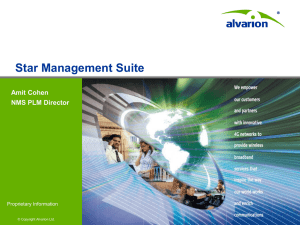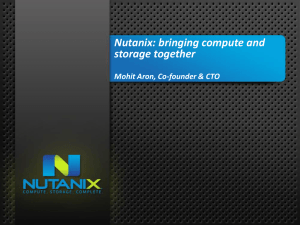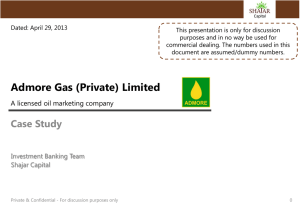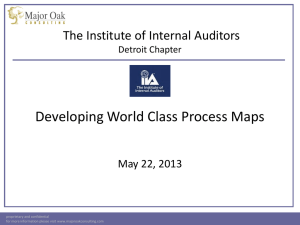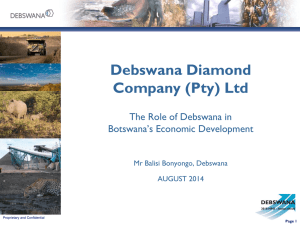Agenda Item 4: Conceptual Framework: Overview of Sessions
advertisement
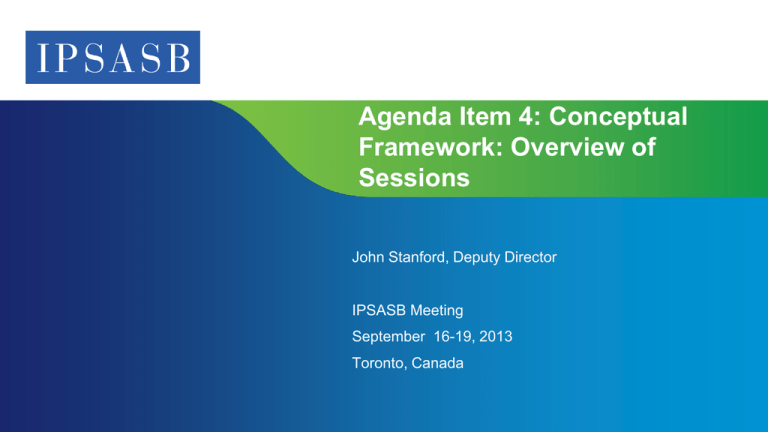
Agenda Item 4: Conceptual Framework: Overview of Sessions John Stanford, Deputy Director IPSASB Meeting September 16-19, 2013 Toronto, Canada Page 1 | Confidential and Proprietary Information Coordinator’s Report Objectives of Sessions • Consider Coordinator’s Report (Agenda Item 4.1) • Continue review of responses to Exposure Draft, Elements and Recognition in Financial Statements (CF–ED2), discuss response to June directions and discuss financial performance and financial position in the context of deferred inflows and deferred outflows (Agenda Item 4A) • Continue review of responses received to Exposure Draft, Measurement of Assets and Liabilities in Financial Statements (CF– ED3) and obtain directions for first draft of final chapter(Agenda Item 4B) Page 2 | Confidential and Proprietary Information International Public Sector Accounting Standards Board Conceptual Framework: Coordinator’s Report Agenda Item 4.1 John Stanford Toronto, Canada September 2013 Page 3 | Confidential and Proprietary Information Coordinator’s Report Coordinator’s Issues • High level summary of initial Staff perceptions on response to Conceptual Framework Exposure Draft 4 (CF–ED4), Presentation in General Purpose Financial Reports • Review Project timetable • Update on IASB Conceptual Framework Project & some relevant points • Preface Page 4 | Confidential and Proprietary Information Coordinator’s Report High Level Summary of Responses to ED, Presentation: Paragraphs 2-5 • 28 responses received by August 20th • Generally supportive • Main issues: – Terminology: display and disclosure (implies hierarchy whereby disclosures are less important, different, not IFRS convergent) – Whether location decisions should be a subset of organization decisions – Fundamental issues related to (a) scope of coverage, (b) need for a “disclosures framework”, and (c) insufficient coverage in the ED Page 5 | Confidential and Proprietary Information Coordinator’s Report Project Timetable: Paragraphs 6-9 and Appendix A (1) • Revised version circulated in early July following last Toronto meeting • Detailed timetable in Appendix A – Reflects decision to make Preface available as Preliminary Board View in late July – No specific request for comments – Preface to be revisited in 2014 Page 6 | Confidential and Proprietary Information Coordinator’s Report Project Timetable: Paragraphs 6-9 and Appendix A (2) • Timetable tight and demanding – Phase 4: Review of responses to ED to final chapter (two meetings) – Phase 2: Further review of financial position and financial performance – Phase 3: Only two meetings to review and approve final chapter • Staff proposal to put approval of Phase 2-4 final chapters & Preface back until June 2014 • Matter for Consideration: Is staff proposal supported? Page 7 | Confidential and Proprietary Information Coordinator’s Report IASB Discussion Paper: Paragraphs 10-14: Timing & Approach (1) • Discussion Paper, A Review of Conceptual Framework for Financial Reporting issued: July 18th 2013 • Consultation period ends: January 14th 2014 • Revised finalization date: December 2015 • Roundtables: October & November 2013: London, Toronto, Sao Paulo, Tokyo Page 8 | Confidential and Proprietary Information Coordinator’s Report IASB Discussion Paper : Paragraphs 10-14: Timing & Approach (2) • Acknowledgement of IPSASB (paragraph 1.15(a)) • Framework Project • Role in setting IPSASs and RPGs • Differences might arise • Presentation at IFRS Standards Advisory Council (October) • DP includes chapters on Objectives & QCs as appendices • • No intention to fundamentally reconsider, but change not precluded March 2010 ED on reporting entity and responses summarized in appendix Page 9 | Confidential and Proprietary Information Coordinator’s Report IASB Discussion Paper: Elements (1) • Asset • Liability • Equity • Income • Expense Definitions with IPSASB equivalents on pages 4 & 5 of Agenda Item 4.1 Economic resource: a right or other source of value, that is capable of producing economic benefits Page 10 | Confidential and Proprietary Information Coordinator’s Report IASB Discussion Paper: Elements (2) • Possible further elements • Cash receipts • Cash payments • Contributions of equity • Distributions of equity • Transfers between classes of equity Page 11 | Confidential and Proprietary Information Coordinator’s Report IASB Discussion Paper: Elements (3) • Revenue, gains, expenses, losses • No separate elements for profit and loss and Other Comprehensive Income • PV that liabilities not limited to enforceable obligations • No consensus but strict unconditionality rejected for liabilities • Few perceived problems with current definitions of revenue and expenses • Executory contracts • Existence uncertainty and outcome uncertainty Page 12 | Confidential and Proprietary Information Coordinator’s Report IASB Discussion Paper: Measurement (1) • Objective: To contribute to the faithful representation of relevant information about the resources of the entity, claims against the entity and changes in resources and claims, and about how efficiently and effectively the entity’s management and governance board have discharged their responsibilities to use the entity’s resources Page 13 | Confidential and Proprietary Information Coordinator’s Report IASB Discussion Paper: Measurement (2) • Mixed-measurement basis • No ideal concept of capital • Number of different measurements smallest to provide relevant information • Three categories • Cost-based measurements • Current market prices • Other cash-flow-based measurements • Deprival value Page 14 | Confidential and Proprietary Information Coordinator’s Report IASB Discussion Paper: Measurement (3) • Current market prices often not directly observable and need to be estimated • Exit price relevant when asset held for sale/entry price held for use rather than sale or exit prices unavailable or do not reflect orderly transactions • Other cash-flow-based category • – Neither current market prices nor cost-based – E.g., impairments, provisions, post-employment liabilities Relevance of particular measurement related to contribution to entity’s future cash flows • Entity and market perspectives – View that entity perspective may be more relevant for assets held for use and for liabilities to be settled by performing services Page 15 | Confidential and Proprietary Information Coordinator’s Report IASB Discussion Paper: Presentation (1) • Presentation: disclosure of information on face of entity’s primary financial statements • Disclosure: broader term; process of providing useful financial information about reporting entity to users • Primary financial statements • Statement of financial position • Statement of profit or loss and OCI (or statement of profit or loss and statement of comprehensive income) • Statement of changes in equity • Statement of cash flows Page 16 | Confidential and Proprietary Information Coordinator’s Report IASB Discussion Paper: Presentation (2) • Notes to the financial statements support the primary financial statements. – • Supplement the primary financial statements by providing additional useful information about: • Assets, liabilities equity, income, expenses, changes in equity and cash flows of the entity; and • How efficiently and effectively the entity’s management and governing board have discharged their responsibilities to use the entity’s resource Types of disclosures that may provide information that meets the objectives of notes: • Reporting entity • Amounts recognized in the primary financial statements • Unrecognized assets or liabilities • Risks • Methods, assumptions and judgments Page 17 | Confidential and Proprietary Information Coordinator’s Report IASB Discussion Paper: Profit and Loss/Other Comprehensive Income • No definition of financial performance • Not equated to particular measures • Recycling • Summary of views for and against • View that recycling should be permitted under certain circumstances • Approaches to OCI • Narrow: Bridging items and mismatched items • Broad: Bridging items, mismatched items and transitory remeasurements – Broad Page 18 | Confidential and Proprietary Information Coordinator’s Report Preface: Paragraph 15 • Decision to defer approval: March 2013 • Direction to make available as Preliminary Board View: June 2013 • Intention to review and approve: 2014 Matter for Consideration: Note position and intention to review in 2014 Page 19 | Confidential and Proprietary Information



